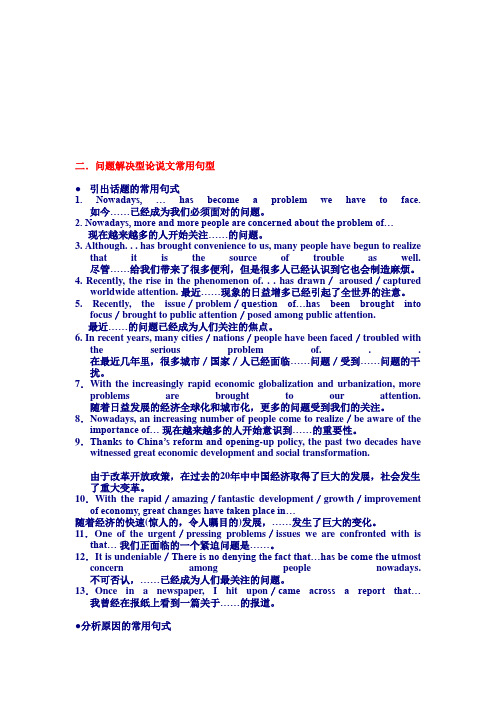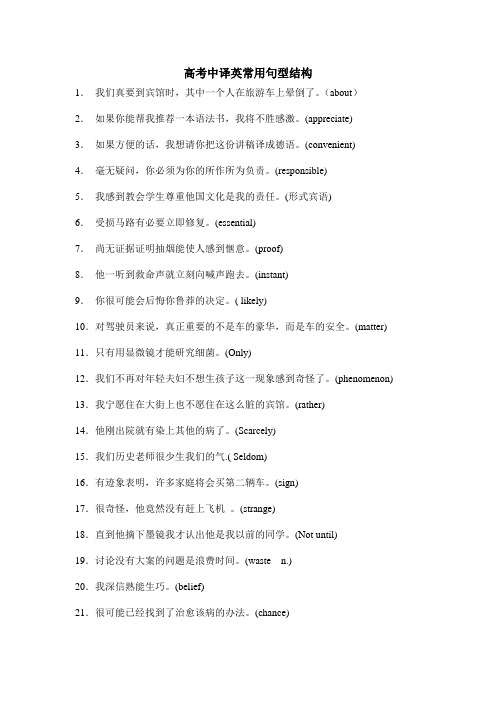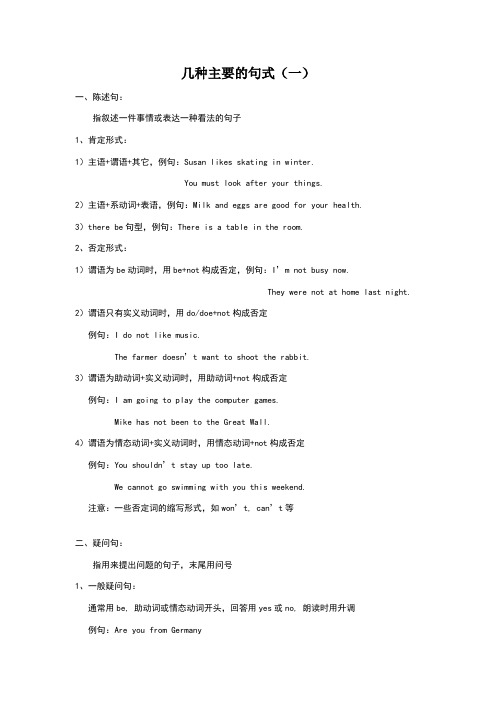句型1
句型转换1——精选推荐

句型转换1新⽬标英语⼋年级上册句型转换句型转换的要点1 含有be动词的陈述句将be动词的适当形式置于句⾸。
切记I改you, We改you, my改your, our改your,最后主谓要⼀致。
2 不含be动词的陈述句借助于助动词do或does(单数第三⼈称),并将其⾄于句⾸,最后助动词do或does后⾯的动词要改动词原形。
3 含有be动词的陈述句变否定句:在be动词后加not.4 不含be动词的陈述句变否定句:借助于助动词do或does,放置⾏为动词前,最后在主动do或does后加not.5 变特殊疑问句:(1)针对划线部分选择适当的疑问词。
(2)特殊疑问词+⼀般疑问句语序物品、事物等---what(什么) 事情、⾝体情况怎么样---how(怎么样)地点---where(在哪⾥) ⼈物---who(谁)主格whom 宾格什么颜⾊---what color 可数名词的数量---how many(多少)不可数名词的数量及问价格---how much(多少/多少钱)how old(问年龄多⼤) How often多久⼀次how long多长时间,多久how soon多久以后how far多远什么科⽬---what subject 哪个节⽇---节⽇---what festival什么俱乐部---what club 哪个,哪些---which具体的点时间---what time 年份、⽉份、⽇期等⾮钟点性时间---when原因(because)---why(为什么)⼀. 改写句⼦。
1.Mary sometimes goes shopping.( 划线提问)2.. He usually plays basketball on Friday afternoon. ( 划线提问)3.She often goes shopping .(改⼀般疑问句)4.Most students do homework every day. ( 划线提问)5.My favorite program is Animal World. ( 划线提问)6.I have a toothache. ( 划线提问)7.He should eat something for lunch. (改为否定句)8.She has a sore throat. (改否定句)9.It started about two days ago. ( 划线提问)10.She’s feeling tired. ( 划线提问) ( 划线提问)11.She is visiting her grandfather next Sunday. ( 划线提问)12.They are staying in Tibet for about two weeks. ( 划线提问)13.I am going skating with Tom. ( 划线提问)14.Show your photos to me when you get back to school.(改同意句)15.She is going shopping on Saturday. ( 划线提问)16.Tom takes a bus to get to school every day. ( 划线提问)17.It’s about 6 kilometers from my home to the station. ( 划线提问)18.Mr Green often takes a boat to work.( 改同意句)19.My sister takes a subway to the park.(改⼀般疑问句)20.He goes to school on foot. ( 划线提问)21.It takes him about five minutes to get home by bus. ( 划线提问)22.Lin Fei’s home is about 10 kilometers from school. ( 划线提问)23.Our bikes are not the same as theirs.(改同意句)24.They are studying for the English test. ( 划线提问)25.Can you come to my birthday party this Sunday?(做肯定回答)26.Can you go to the shop with me?(做否定回答)27.she has to stay at home and do her homework. ( 划线提问)28.The boys have to practice soccer every day.(改⼀般疑问句)29.I like singing. My sister likes singing too.(改同意句)30.Sue is twelve years old. Gina is fourteen years old.(改同意句)31.Jim is twelve years old. Tim is twelve years old, too.(改同意句)32.He favorite subjects are physics and P.E.. ( 划线提问)33.Paul is quieter than Sandy. (改⼀般疑问句)34.I think she is good at playing soccer.(改否定句)35.John enjoys swimming. Peter enjoys swimming, too.(改同意句)36.Her bike is not as new as yours. (改同意句)37.This book is not as interesting as that book.(改同意句)38.His desk is smaller than your desk.(改同意句)39..Betty likes green sweaters. Betty doesn’t like red sweaters.(⽤but将两句话连起来)40.I think a good friend can make me laugh.41.I live ten miles from school.42.I’m going on the 12th.43.I’m going to Tibet for a week.44.I think it’s good for my health.45.We need two teaspoons of cinnamon.46.We need two tomatoes.47.My school trip was really boring.48.Her friend Grace bought a souvenir49.Tina met a famous actor.50.Tina got Jack Denis’ autograph.51.Class 9 had a great time on the school trip.52.My day off was really funny.53.I had a very fun day.54.Maria won the first prize in yesterday’s singing competition。
问题解决型英语论说文常用句型(1)

二.问题解决型论说文常用句型●引出话题的常用句式1. Nowadays, … has become a problem we have to face.如今……已经成为我们必须面对的问题。
2. Nowadays, more and more people are concerned about the problem of…现在越来越多的人开始关注……的问题。
3. Although. . . has brought convenience to us, many people have begun to realizethat it is the source of trouble as well.尽管……给我们带来了很多便利,但是很多人已经认识到它也会制造麻烦。
4. Recently, the rise in the phenomenon of. . . has drawn/ aroused/capturedworldwide attention. 最近……现象的日益增多已经引起了全世界的注意。
5. Recently, the issue/problem/question of…has been brought intofocus/brought to public attention/posed among public attention.最近……的问题已经成为人们关注的焦点。
6. In recent years, many cities/nations/people have been faced/troubled withthe serious problem of. . .在最近几年里,很多城市/国家/人已经面临……问题/受到……问题的干扰。
7.With the increasingly rapid economic globalization and urbanization, more problems are brought to our attention.随着日益发展的经济全球化和城市化,更多的问题受到我们的关注。
上海高考中译英常用句型结构1

高考中译英常用句型结构1.我们真要到宾馆时,其中一个人在旅游车上晕倒了。
(about)2.如果你能帮我推荐一本语法书,我将不胜感激。
(appreciate)3.如果方便的话,我想请你把这份讲稿译成德语。
(convenient)4.毫无疑问,你必须为你的所作所为负责。
(responsible)5.我感到教会学生尊重他国文化是我的责任。
(形式宾语)6.受损马路有必要立即修复。
(essential)7.尚无证据证明抽烟能使人感到惬意。
(proof)8.他一听到救命声就立刻向喊声跑去。
(instant)9.你很可能会后悔你鲁莽的决定。
( likely)10.对驾驶员来说,真正重要的不是车的豪华,而是车的安全。
(matter) 11.只有用显微镜才能研究细菌。
(Only)12.我们不再对年轻夫妇不想生孩子这一现象感到奇怪了。
(phenomenon) 13.我宁愿住在大街上也不愿住在这么脏的宾馆。
(rather)14.他刚出院就有染上其他的病了。
(Scarcely)15.我们历史老师很少生我们的气.( Seldom)16.有迹象表明,许多家庭将会买第二辆车。
(sign)17.很奇怪,他竟然没有赶上飞机。
(strange)18.直到他摘下墨镜我才认出他是我以前的同学。
(Not until)19.讨论没有大案的问题是浪费时间。
(waste n.)20.我深信熟能生巧。
(belief)21.很可能已经找到了治愈该病的办法。
(chance)22.今天越努力,明天就越不会后悔。
(the more…, the more…)23.我从未像如今这样热爱过中国文学。
(Never)24.我不懂他为何改变主意,也不在乎。
(nor)25.你在其他任何地方也找不到如此齐全的表链收藏。
(Nowhere)26.他从未想过自己是最晚的知噩耗的人.(occur)27.既然没有人支持你,再坚持这个计划就没有意义了。
(point)28.没有收集事实得出结论有何用呢?(point)29.你不可能在一年之内获得所是学位。
几种主要的句式(一)

几种主要的句式(一)一、陈述句:指叙述一件事情或表达一种看法的句子1、肯定形式:1)主语+谓语+其它,例句:Susan likes skating in winter.You must look after your things.2)主语+系动词+表语,例句:Milk and eggs are good for your health.3)there be句型,例句:There is a table in the room.2、否定形式:1)谓语为be动词时,用be+not构成否定,例句:I’m not busy now.They were not at home last night. 2)谓语只有实义动词时,用do/doe+not构成否定例句:I do not like music.The farmer doesn’t want to shoot the rabbit.3)谓语为助动词+实义动词时,用助动词+not构成否定例句:I am going to play the computer games.Mike has not been to the Great Wall.4)谓语为情态动词+实义动词时,用情态动词+not构成否定例句:You shouldn’t stay up too late.We cannot go swimming with you this weekend.注意:一些否定词的缩写形式,如won’t, can’t等二、疑问句:指用来提出问题的句子,末尾用问号1、一般疑问句:通常用be, 助动词或情态动词开头,回答用yes或no, 朗读时用升调例句:Are you from GermanyYes, I am./No, I am not.May I borrow your rulerYes, you can./No, you can’t.Does he often swim in summerYes, he does./No, he doesn’t.2、特殊疑问句:指对句子中某一部分提问的疑问句,以疑问词开头,一般用降调1)what引导的,用来询问“什么”,例句:What’s the time now, JackWhat colour is the carWh at’s the weather like todayWhat did you do last night2)who引导的,用来询问“谁”,例句:who’s on duty todayWho told you the news3)whose引导的,用来询问“谁的”,例句:Whose coats are these4)which引导的,用来询问“哪一个”,例句:Which grade are you inWhich bag will they buy5)when引导的,用来询问“什么时候”,例句:When did you go outWhen does the school begin6)why引导的,用来询问“为什么”,例句:Why is she cryingWhy don’t we go together7)where引导的,用来询问“在哪里”,例句:where does Mr. White liveWhere did they have a picnic8)how引导的,用来询问“怎么样”,例句:How are you todayHow do you go to school every day how many一般问数量,例句:how many carrots does the rabbit eathow much一般问价格,例句:how much is the fishHow long一般问时间长短,例句:how long will you stay thereHow often一般问频率,表示“多久一次”,例句:how often do they go to the cinema 9)特殊疑问句的回答:不用yes或no, 根据实际情况,问什么就直接答什么3、选择疑问句:1)一般疑问句+or+可选择部分:例句:Do you like tea or coffeeDid they go to the gym by bike or by bus 2)选择疑问句+可选择部分+or+可选择部分例句:Who is Uncle Li, the old one or the young oneHow do you come here, by car or on foot注意:一般疑问句后面+or not, 也可以构成选择疑问句例句:Do you like the new dress or notHave you had breakfast or not3)选择疑问句的回答:不用yes或no, 根据实际情况直接回答4、反意疑问句:在陈述句后面,对陈述句所说的事实或看法提出疑问的句子1)肯定陈述句+否定结构的附加疑问句例句:Anny and Tom are classmate, are n’t theyHe visited the Science Museum with Ben, didn’t he2)否定陈述句+肯定结构的附加疑问句例句:Andy can’t speak English, can heSusan isn’t very busy, is she3)反意疑问句的回答:用yes或no来回答,如果陈述句部分内容是事实,就用yes来回答,后面用肯定结构,反之用no来回答,后面用否定结构例句:You can speak Russian, can’t youYes, I can./No, I can’t.It isn’t hot, is itYes, it is./No, it isn’t.三、综合练习:1、把下面句子分类:1)Would you like some potatoes2)Are you coming or not3)Sally didn’t go to the party, did she4)May I use your computer5)The cheese has gone bad, hasn’t it6)Who’ll be there tomorrow7)Can you buy me some salt8)Where should I put these boxes9)Is the answer right or wrong10)what do you think of the film一般疑问句_____________________________________________特殊疑问句_____________________________________________选择疑问句_____________________________________________反意疑问句_____________________________________________2、对下列问题,作简单的回答:1)Can you ride a bike Yes, _____________________2)Is there anyone at home No, ______________________3)Are you enjoying your English lesson Yes, ___________________ 4)did they have a good time last night Yes, __________________ 5)Has Mr Lee come back from his holiday No, __________________3、根据回答,给疑问句补上恰当的疑问词:1)________ is your name Smith.2)________ do you go to market By bus.3)________ are the Greens coming On Sunday.4)________ dictionary is this It’s Lily’s.5)________ is the chair It’s behind the door.6)________ is the man with a beard He is Mr. Black.7)________ do you like better, baseball or tennis Basket ball, I think.8)________ are you always late Because of the traffic jam.4、将下面的反意疑问句补充完整:1)i am a good singer, ________ I2)You are feeling much better now, ________ you3)Fred doesn’t work in a factory, ________ he4)The children clean their room themselves, ________ they5)You haven’t heard from him, ________ you5、阅读理解:(一)It is Sunday weather is fine. Bob and Jane are in the park. It is a bi g park. They can see many people there. They come here to have a rest after a week’s hard work and study. Some boys are playing chess on the grass. So me girls are singing and dancing. An old woman is reading a newspaper under a tall tree. A young man and his little son are playing with a toy car. Ho w happy they are!判断正误,正确的在括号内写“T”,错误的写“F”()1. The weather is very good on Sunday.()2. Bob and Jane go to the park to work and study..()3. A young woman and her little son are playing with a toy car.()4. A lot of people are playing football on the grass.()5. All the people in the park look very happy.(二)A: Hello,Nancy, Welcome to my home!B: Thank you, Mike. What’s that over thereA: It’s my family photo.B: Who’s the man in dark green.A: He’s my grandfather.B: Are the man and woman your parentsA:Yes. The one with a big nose is my father. The one next to him is my mother.B: Is the girl in a red skirt your sisterA: No, she’s my uncle’s daughter. She is my cousin, Lily.B: She looks young and pretty. Is the woman in a white blouse you r grandmotherA: Yes, she is. She’s about sixty years old.B: Who’s the little baby in a blue hat Is he your brotherA: No , it’s me!阅读对话,回答问题。
课件初中五大基本句型(1)主谓宾、主系表句型-【慕联】初中英语中考复习之句型

初中英语五大句型分析(1)
-主谓宾,主系表结构
-------
Rita
[慕联教育中考专题课程] 课程编号:ZS1709010203ZK01CZQ
句子是由什么组成的?
人、事、物
动作 / 状态
宾语
谓语
very much. I have a handsome son. I'm famous
宾语
表语
in China and in the world. Who am I?
主语
谓语
主语&谓语&宾语
人、事、物
动作
主语 发出
谓语 承受者 宾语
主语:主语是一个句子中所要表达,描述的人或事或物 谓语:主语发出的动作 宾语:宾语是动作的对象或承受者
主谓宾结构
寻找下列句子中的主 谓 宾。
1. 我 懂 你。 2. 我的家乡发生了巨大的变化。 3. I have two ping-pong bats. (人教版七下unit5) 4. I make some interesting and fun things this term.(人教版七下unit8) 5. The teacher says English is very useful. (人教版七下unit9)
be动词
表像系动词 • look, smell, sound, taste...
感官动词
持续系动词 • keep, remain, stay
主系表结构---练习
寻找下列句子中的主 系 表。 1. That flower smells good.
高中英语句型分阶段训练1含答案及解析

高中英语句型分阶段训练(1)一.在空白处填写适当的词,并标明词义★★★★★第1---2单元1. In class , all of you are sitting _____ I am standing all the time.2.You can’t be too careful ______ (you are) crossing the street in the rush hour.3.______ I can’t think of a better idea, I still don’t agree to his.二.在空白处填写适当的词,并总结规律1.Robinson was the only one ________(survive )the sinking(沉船事故)。
2.Mo Yan is the first Chinese _____( win) a Nobel Prize in Literature.规律:三.总结每个句子的句型结构:A. There are times when people are so_____( tire)that they may fall asleep almost anywhere.B.There are ____many cars on the express way during holidays that travelers often get stuck in traffic jams.C. In the past , there was _____much smog in the air that we could hardly see the blue sky.D. It is ____ lovely a day that we all want to have a hiking outside.E. It is _____a lovely day that we all want to have a hiking outside.F.. They were _____ honest businessmen that their business was a big success.G. It was _____ bad weather that we all stayed at home all the day.四..(1)填并列连词并总结句型结构A.We were having a dinner ______a stranger broke in.B.We were about to go out _______ someone knocked at the door.C. The thief was on the point of putting his hand into the lady’s handbag _____ the bus suddenly stopped.D. The boy ____ just ________(finish) his homework when his mother asked him to practice playing the piano.E. Hardly had he rushed out of the burning house ______ it collapsed.(2)填从属连词A.What were you doing when your headmaster______( step) into the classroom?B. 既然Why do you want to have a new job ______ you have got a well-paid one?五. _________复合结构(1)In the waiting room, everyone is sitting on the bench _____ a cellphone in his hand.(2)In summer, we usually sleep ______the windows open.(3) ________the beautiful moon up in the sky, we sit together and eat mooncakes and fruit , sharing our stories.(4) With much homework ______( do) every day, we are quite busy.(5) With the fire________( burn) all night long, they felt very warm(6) With a great weight_______( take) off her mind, she passed the tests successfully.六.祈使句做条件句+and/or+陈述句If you lend her a hand , she will be grateful to you .Lend her a hand , ______ she will be grateful to you .If you don’t go away, I will call the police.Go away, ______ I will call the police.★★★★★第3---4单元七.It 句型的转换[同义句改写] 由复合句向简单句的转换:(1)sb./sth. is said/thought/believed...to do/to be doneIt is said that he often helps the people in need.(用he作主语改写)→He _____ often ______ ______ help the people in need.It is reported that a new shopping mall will be built in the downtown of the city next year. →A new shopping mall is said to_____ ______ ______( build) in the downtown of the city next year.(2)Somebody/something is/was said to be doingIt is said that we are living in an information age.We are said to ____ _______(live) in an information age.(3) Somebody/something is/was said to have done/to have been done It was said that he was the first driver who was arrested because of drunk-driving→He was said to _____ ______( be) the first driver who was arrested because of drunk-drivingIt is said that a new plan has been worked out in this company.(用plan作主语改写)→A new plan is said to _____ _____worked out in this company.八. 填写引导让步状语从句的从属连词1._____ ______it is so hard a task, we must try to finish it on time.2._______ Kong Xiang dong is changing his appearance or transforminghis music,he is a pioneer in music today.无论孔祥东改变外貌还是转变音乐风格,他都是当今音乐领域的先驱。
英语句子结构分析 (1)
7. 状语:用来修饰动词,形容词,副词或句子。是谓 语的附加成分。表示谓语动词发生的,时间、地点、 原因、目的、结果、程度、条件、方式和让步。
I will go there tomorrow. The meeting will be held in the meeting room. The meat went bad because of the hot
tall like a tree. It做形式主语,真正的主语是主语从句
2、谓语动词说明主语的动作或状态,回答 “做(什么)”。主要由动词担任。如:
Jack cleans the room every day.
which word is 谓语 ① I don't like the picture on the wall. ② The days get longer and longer when
summer comes. ③ Do you usually go to school by bus? ④ Seeing the snake, the girl ssttoooodd under the
tree, frightened out of life.
基本句型1: 主语+谓语(不及物动词) 1. I work in a hospital. 2. Last night I came home late. 3. He runs very fast. 4. We have to study hard. 5. Tom’s cat died last week. 6. Things change so quickly.
句型转换专练一
句型转换专练⼀句型转换专练⼀单句改错。
(每句有⼀处错误,请改正。
)1.There have eight oranges on the desk. 2.Alice and I are in a same school. 3.Is that bike his or your? 4.This photo look like Tom's. 5.They are woman teachers in our school. 6.Can he looks after his little brother? 7.I visiting my grandparents now. 8.How's the weather in Chengdu? It's cloud. 9.I think he isn't so great. 10.I can go shoping, and nobody knows me.按要求改写下列句⼦。
1.There was some orange juice in the bottles.(改成否定句)There ________ ________orange juice in the bottles.2.Mr. White worked in Shanghai last year.(对划线部分提问)________ ________ Mr. White ________ in Shanghai?3.Jim Green visited some places in Chengdu yesterday.(改成⼀般问句) ________ Jim Green ________ ________ places in Chengdu yesterday? 4.根据A句完成B句,使两句意思相近。
A.We had a good time last Sunday.B.We had a ________ ________ fun last Sunday.5.根据A句完成B句,使两句意思相近。
初中英语重点句型中固定短语的用法
初中英语重点句型中固定短语的用法初中英语重点句型中固定短语的用法1.There be 结构a.这是英语中常见的一种结构,表示“某地有某物”其含义为“存在有”。
eg.There are twenty girls in our class.have也解释为“有”但是与there be有区别,它的含义是“所有,属有”,其主语为某人。
eg.I have a nice watch.b.There be 结构中的be动词要和后面所跟名词保持一致。
c.There is a river near our school.否:There is not a river near our school.问:Is there a river near our school.回答:Yes, there is. No, there isn’t.划⑴How many rivers are there near our school?⑵What’s near our school?d.there be 结构的一般将来时,同学们较难掌握,其正确形式为:there is going to bee.反意疑问句的构成:There is no water in the glass, is there?①There is going to _____ a football match this afternoon.A.haveB.watchC.beD.play②They were sure that they were going to ____ a rest.A.beB.haveC.be onD.on2.so,neither引导的倒装句,为了避免和前一句话的内容重复,英语中习惯用so,neither引导的倒装句。
a.So+be(助动词,情态动词)+主语。
表示某人也是如此。
eg.Mike has bought some foreign stamps.So has Bob.=Bob has bought some,too.b.Neither+be(助动词,情态动词)+主语,表示某人也不。
高一英语必修一必背句型
高一英语必修一必背句型(一)1) It was the first time in a year and a half that I had seen the night face to face. (从句时态用完成时) 这是我一年半以来第一次目睹夜晚。
2) I wonder if it’s because I haven’t been able to be outdoors for so long that I’ve grown so crazy about everything to do with nature.(强调句) 我不知道这是不是因为我长久无法出门的缘故,我变得对一切与大自然有关的事物都无比狂热。
3) I stayed awake on purpose until half past eleven one evening in order to have a good look at the moon for once by myself.有一天晚上,我熬到11点半故意不睡觉,为的是独自好好看看月亮一次。
4)Your friend, who doesn’t work hard, asks you to help him cheat in the end-of-term exam.(非限制性定语从句) 你的一个朋友叫你在期末考试中帮他作弊,这个朋友平常不认真学习。
5) If you have some trouble (in) getting along with your friends, you can write to the editor and ask for advice.如果你在和朋友的相处上有问题,你可以写信给编辑向他征求建议。
6)Add up your score and see how many points you can get.把你的得分加起来,看看得了多少。
- 1、下载文档前请自行甄别文档内容的完整性,平台不提供额外的编辑、内容补充、找答案等附加服务。
- 2、"仅部分预览"的文档,不可在线预览部分如存在完整性等问题,可反馈申请退款(可完整预览的文档不适用该条件!)。
- 3、如文档侵犯您的权益,请联系客服反馈,我们会尽快为您处理(人工客服工作时间:9:00-18:30)。
句型1 would rather that somebody did…“宁愿……;更愿意……”(表示现在或将来的愿望) would rather that somebody had done…“宁愿……;更愿意……”(表示过去的愿望) [例句] i„d rather you posted the letter right now. 我想让你现在去寄信。 i‟d rather you were not a celebrated actor. in that case, we could spend more time together. 我到情愿你不是个知名演员,这样我们可以有更多的时间在一起。 i„d rather that i hadn‟t seen her yesterday. 我情愿昨天没有看到她。 句型2 as if/though+主语+did/had done…好像……(表示现在或将来的情况用过去时;表示过去的情况用过去完成时)[参考句型4] [例句] our head teacher treats us as if we were her own children, so all the students in our class think highly of her. alan talked about rome as if he had been there. alan谈起罗马来就好像他去过那里似的。 句型3 “wish +宾语从句”,表示不大 可能实现的愿望 表示现在的愿望:主语+过去时; 表示过去的愿望:主语+had done; 表示将来的愿望:主语+would/could do [例句] how i wish we students had more free time to relax ourselves!我们学生多么希望有更多的自由时间放松自己! i failed in the maths exam. how i wish i hadn„t wasted so much time playing! what a pity you can‟t go to the party. how i wish i could dance with you at the party! 句型4 it„s high/about time that somebody did (should do) (should通常不省略) …早就该…… [例句] it‟s time that you went to school.= it„s time that you should go to school. it‟s high time that we did something to improve our environment. 该是我们为环保做些事情了。 i think it„s high time that she made up her mind. 我想她该拿定主意了。 句型5 情态动词+动词不定式完成结构的用法 could have done “本来可以……”(表示过去没有实现的可能)。 might have done “本来可能……;本来应该或可以做某事”(实际没有发生;含有轻微的责备语气。 should/ought to have done “本来该做某事”(而实际未做) should not/ought not to have done “本来不该做”(实际却做过了,含有责备语气) needn‟t have done “本来不必做”(但是已经做过了) would rather have done “当时宁愿做了某事”(实际没有做过);否定式would rather not have done表达相反意思,两者都有表示“后悔”之意。 句型6 as, though, although引导的让步状语从句。 [注意]although位于句首;though位于句首或句中;as位于句中=though。它的词序是把句中强调的形容词、副词、动词或名词放在连词前。[参考倒装结构]请注意下列句式的变化: [例句] 1. although/though i„m young, i already know what career i want to follow. →young as/though i am, i already know what career i want to follow. 我虽然年轻,但我已经明白我应该追随什么样的事业。 2. although/though i respect him very much, i cannot agree with his idea. →much as/though i respect him, i cannot agree with his idea. 虽然我很尊重他,但是我不同意他的观点。 3. although/though he is a child, he knows a lot of chinese characters. →child(省略冠词)as/though he is, he knows a lot of chinese characters. 他虽然还是个孩子,却认识了许多汉字。 4. although he tried, he couldn‟t solve the problem. →try as he might, he couldn„t solve the problem. 尽管他努力了,但是他没有解决问题。 5. although it is raining, i‟m going out for a walk. →raining as it is, i„m going out for a walk. 天虽然在下雨,我还是要出去散步。 6. strange as it may seem, nobody was injured in the accident. 这次意外虽然显得不可思议,却没有人受伤。 7. much as i would like to help, i have a lot to do. 虽然我很想帮助你,但是我有很多事要做。 8. object as you may, i will go. 纵使你反对,我也要去。 句型7 …before…特殊用法(1)“没来得及……就……” [例句] the roof fell before he had time to dash into the room to save his baby. 他还没有来得及冲进房间救孩子,房顶就塌了。 he ran off before i could stop him. 我还没有来得及阻止,他已经跑了。 to my great disappointment, my favorite singer left the concert before i could have a word with her. 让我非常失望的是,我还没有来得及和我最喜欢的歌手打招呼,她就已经离开了。 句型8 …before…特殊用法(2)“过了多久才……”或“动作进行到什么程度才……” [例句] they walked about fifty miles to the west before they saw a village. 他们西行50英里才看到一个村庄。 the workers worked day and night about three days before everything returned to normal. 工人们连续工作3天才使一切恢复正常。 he almost knocked me down before he knew it. 他几乎撞到我了才认识到。 we had walked a long way before we found some water. 我们走了很长的路才找到一点水。 five years went by before i knew it. 不知不觉,五年过去了。 句型9 it was + 时间段+before…。“过了多久才(怎么样)……” it was not long before…。“不久,就……” it will (not) be +时间段+before…。“要过多久(不久)……才……”(before从句谓语动词要用一般时态) [例句] it was not long before he sensed the danger of the position.不久他就认识到他处境的危险。 it was five days before he came back. 五天后他才回来。 it will be half a year before you graduate from the school. 再过半年你才能毕业。 it will not be long before they understand each other. 他们大概不久就会互相了解。 句型10 in case of…(+n.) “以防;万一”; in case that…“以防,万一……”(谓语动词用一般现在时态或should+动词原形) [例句] in case of fire, what should we do? please remind me about it in case i forget/should forget. 万一我忘了,请提醒我。 in case (that) john comes/should come, please tell him to wait. please take your umbrella in case (that it rains/should rain)。带上雨伞,以防下雨。 句型11 it强调句型 强调句的基本构成:it is/was + 被强调的部分 + who(主要指人时)/that + 其余部分 [注意1] 这种结构可以强调句子的主语、宾语、状语(包括时间,地点,方法,原因等),但是不能强调谓语动词(参考句型15)。请点击腾讯认证蔡章兵主编QQ757722345空间顶部“关注”和加微信czbqsyy可获得我每天更新的信息。 原句的谓语动词如果是现在或将来时态,用it is…that/who…。;
